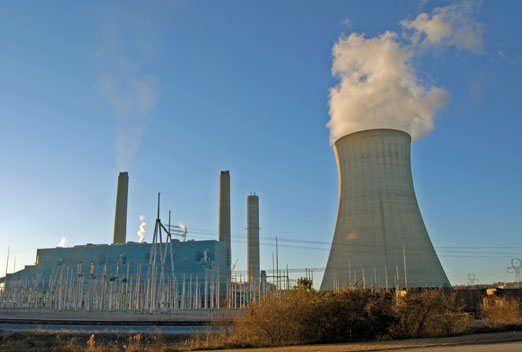
Alabama Power’s Miller Steam Plant on the Locust Fork of the Black Warrior River emits more mercury into the air than any other power plant in the country. It is also a source of fine particulate pollution and ozone, which cause the Ozone allergy or the Ozone Flu: Glynn Wilson
By Glynn Wilson –
How the federal government fights climate change will be on the docket of the U.S. Supreme Court on Monday in a rare 90 minute oral argument session, an indication that the court thinks cases against the Environmental Protection Agency filed by chemical industry groups, conservative states and the U.S. Chamber of Commerce are important ones to consider.
The high court consolidated cases filed against the Obama administration’s powers to regulate power plant emissions under the authority of the EPA by the American Chemistry Group, Energy-Intensive Manufacturers, the Southeast Legal Foundation, the state of Texas and the U.S. Chamber of Commerce, and set aside 90 minutes for oral arguments instead of the usual 60 minutes.
The arguments on the docket for Monday are about an important piece of the EPA’s plans to cut emissions from power plants, a rule requiring power companies to evaluate ways to reduce the carbon they release when expanding plants or building new ones.
The cases came before a three-judge panel of the U.S. Circuit Court of Appeals for the District of Columbia in 2012, and they concluded that the EPA was “unambiguously correct” in using existing federal law to address power plant emissions to fight climate change due to global warming from the burning of fossil fuels.
A related case from 2007 may be an indication of how the court will rule, according to the Associated Press. The Supreme Court concluded that the agency has the authority under the Clean Air Act to limit emissions of greenhouse gases from vehicles in the case of Massachusetts v. EPA.
Given the authority by previous Supreme Court rulings, and with his hands tied on the legislative front by the Republicans in Congress, President Obama pledged to act on environmental matters when Congress refuses.
But industry groups and Republican-controlled states are hoping to use the Supreme Court to stop federal regulations to limit power-plant and factory emissions of greenhouse gases widely recognized by scientists as the cause of global warming and climate change, and their spokesmen are going around on the Web, talk radio and cable TV calling the regulations “a power grab of historic proportions.”
Environmental groups and even some of their opponents agree that whatever the court decides in this case, the federal agency still will be able to set emission standards on greenhouse gases for new and existing power plants. But a court ruling against the EPA would be used to challenge every step of the agency’s effort to deal with climate change in the future.
Jacob Hollinger, a partner with the McDermott Will and Emery law firm in New York and a former EPA lawyer, told AP the case will have political and practical implications either way.
“Will they be successful? We don’t know yet,” Hollinger said. “But it would be an important victory in a political sense and, potentially, a practical sense.”
Fueled by the money from polluting corporations and spurred on by their anti-environment, pro-industry right wing, Republicans in Congress have fought the administration’s plans to push forward with the regulations after Congress failed to pass a climate bill. The administration of President George W. Bush consistently resisted such regulations, insisting on a deregulation approach to governing.
But since Obama took over the White House in 2008, the EPA has concluded that the release of carbon dioxide and other heat-trapping gases endangered human health and public welfare. The administration used that finding to extend its regulatory reach beyond automobiles and developed national standards for large stationary sources of pollution, the largest source being coal-fired power plants that generate electricity.
The administration has proposed first-time national standards for new power plants and expects to propose regulations for existing plants this summer. The plan is to then move on to other large stationary sources of pollution, other manufacturing plants, over the next couple of years.
Without new federal legislation, the only way EPA can force corporations to address greenhouse gas pollution is through the permitting process, which now requires the agency to analyze the best available technologies to reduce carbon dioxide, the worst and most prevalent greenhouse gas.
Yet the U.S. Chamber of Commerce, 13 states led by Texas and utility industry groups are asking the high court to rule that the EPA overstepped its authority by trying to regulate greenhouse gas emissions through the permitting program. Peter Keisler, representing the American Chemistry Council among two dozen manufacturing and industry groups that want the court to throw out the rule, said in court papers that the EPA’s actions “represent one of the boldest seizures of legislative authority by an executive agency in history.”
But the narrow question framed by the court in advance of oral arguments has environmental advocates minimizing the significance of the case, although some environmental groups are criticizing the industry’s challenge and stress that the Supreme Court traditionally gives broad deference to the EPA to interpret the Clean Air Act, according to AP and NPR.
“Twice, the Supreme Court has affirmed the EPA’s authority to regulate climate pollution,” said Vickie Patton, general counsel for the Environmental Defense Fund. “It’s a very legalistic argument that’s designed to prevent EPA from protecting America’s families and communities from climate pollution.”
A dozen states, including New York, California and Illinois, support the administration’s position in court filings, as well as the American Thoracic Society, which filed a legal brief detailing the health costs of climate change.
Calpine Corp., which operates natural gas and geothermal power plants around the nation, also supports the regulation in court filings, in which it said it has gone through the permitting program six times and found it “neither overly burdensome nor unworkable.”
Over the past three years, EPA permits have been issued for 141 facilities nationally.
Stay tuned to see how the mainstream media covers the case on Monday. It may be months before the court issues a ruling.














Reader Supported News - No Paywall, Google Ads, Popup Ads, Sponsored Content or A.I. - Support American Journalism with GoFundMe
Looks like Kennedy, the deciding vote, is trying to find a way to strike this rule down. Let’s hope his questions were answered today.
Supreme Court appears divided in case that deals with climate change, executive power